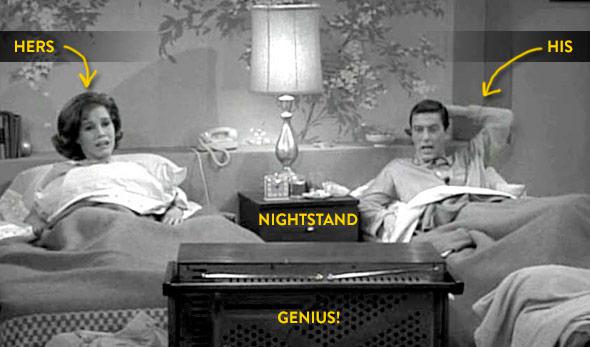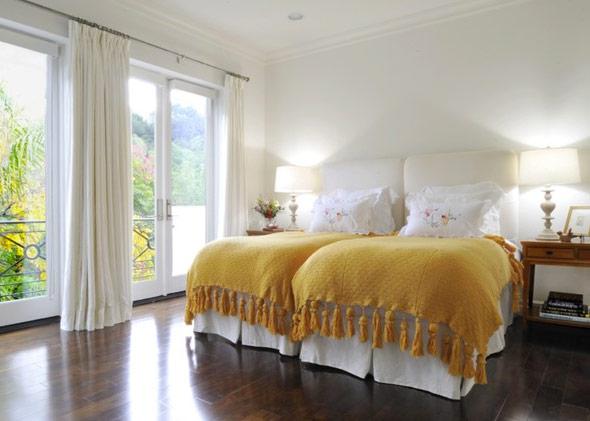The other night I slept on a twin bed in the guest room of the house I share with my husband and our two kids. We have a comfortable, firm king-size bed in our master bedroom, but my husband was sick and gross, so rather than hop in the sack with him, I decided to quietly slip down the hallway and sleep alone.
It was the best night’s sleep I’ve had in years.
For once, I was able to sleep in my preferred position—on my stomach in a big X, socked foot hanging off the bed to the right, sockless foot hanging off the bed to the left. There was no tug of war over the covers, no pokes in the back to alert me to my snoring, no waking up to a wiggly kid (or two) in bed with us. In fact, no waking up at all. It was, pardon the pun, a dream.
Having slept so great solo made me wonder, why don’t we all sleep alone?
I tossed this question to the hive mind at Slate and was surprised that many had similar feelings.
“Yes! I think about this all the time.”
“Bring back separate beds!”
“I recall liking [sharing a bed] at one point … but now … after like 9 years all I think is, ‘Stop breathing on me!’”
“Humans are surprisingly hot. Sharing a bed with a person is like sleeping with a radiator. When I have a girlfriend, there’s a ‘cuddling time’ after which we move as far away from each other as possible to actually sleep. But I’m romantic that way.”
Exactly. Sharing a bed is good for sleeping together, but not actually sleeping together. We all know the importance of sleep, so why then do we still choose to share our beds with the kickers, the snorers, and the human furnaces that we love?
“Man since time immemorial has made preparation for sleep, either laying an animal pelt on the ground or using plant matter as some sort of mattress,” according to sleep expert Dr. Neil Stanley. “Originally we all slept together on the ground, mainly because we had nowhere else, but also for warmth and security.”
Warmth and security? We have flannel pajamas and deadbolts now.
There have been times throughout the history of slumber that couples did not share a bed. Ancient Romans retreated to their separate quarters in the evening. On The Dick Van Dyke Show, Laura and Rob Petrie turned in to their separate beds, and I bet they slept great.

CBS Photo Archive
The only thing I’d change about this setup would be to shove the beds closer together and have two nightstands on either end. Having your own bed is a luxury. Having your own bed and nightstand? Yes, please.
Our first married bed was a queen. It sagged terribly in the middle and made us roll together. We’d wake up spooning—forced that way by the bed—and sweaty. Our second bed, also a queen, developed a rather large hump in the middle from all the edge hugging we did during the night. Ten years into our marriage, we finally have a king. There is more than enough room for our whole family to sleep comfortably, yet that twin the other night—it was amazing.
So what’s holding me back from selling our king mattress and ordering two twins? Society! Mention separate beds today and most people assume marital troubles.
“In our culture, sharing a bed is a sign of intimacy, and it could also be a barometer of the health of the relationship,” sleep expert Dr. Anne D. Bartolucci told me when I called her for backup. “Falling asleep in the company of another person puts you in a very vulnerable position, and it shows a certain amount of trust. There’s a reason that ‘sleeping with’ someone is one of our expressions for sex. Also, it’s a bonding experience, and it’s been shown that couples who share a bed communicate better and experience other benefits like increased levels of oxytocin, which can reduce inflammation.”
I don’t suffer from inflammation. I do suffer from bad sleep. And chronic bad sleep, according to Bartolucci, has been shown to increase the likelihood of stroke and heart attacks. It makes people more susceptible to developing not only health problems like diabetes and high blood pressure but also conditions like obesity that increase the risk of major health issues. It also contributes to or exacerbates psychiatric problems like anxiety, depression, and attention deficient hyperactivity disorder. Why must we risk these things just to prove to ourselves that we are happy couples? Separate beds means better sleep, which in turn can produce healthier spouses and a happier marriage. I rest my case.
Though when I gingerly mentioned this theory to my husband and he agreed with me, I did feel a tiny bit hurt.
